This “Limited Edition” 4K Ultra HD title is currently available from Arrow Video.
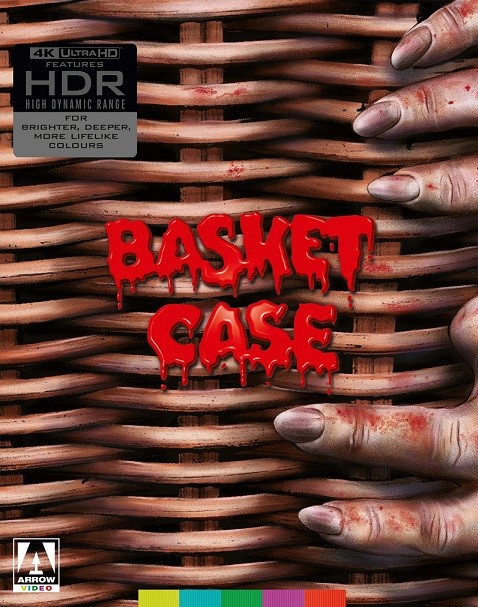
When you think of films in desperate need of a 4K Ultra HD restoration, grimy, ultra-low budget titles may not be the first type that come to mind. However, a lot of the time these are pictures in the most immediate need of rescuing. Basket Case was an eccentric production made on a tiny budget of $35,000 dollars. Writer/director Frank Henenlotter had made a few shorts, but this effort marked his first foray into features. He and other participants weren’t even sure that the project would get completed. But it was finished and after having a tough time finding distribution, landed a small one that did put it in theaters. And even then, it took the movie a long time to find its audience. But, thanks to a few rave reviews it developed a cult following.
So, it isn’t difficult to see how the original 16mm elements might need saving. Recently, the Museum of Modern Art in New York took the original negative, as well as a 35mm interpositive and 35mm dupe negative and restored them to restore the film with the best image quality possible. A little project like this is never going to look crystal clear and frankly, it shouldn’t as it is a horror/comedy capturing Manhattan during a very grimy period in its history. However, the film does appear cleaner than even and better than it ever looked up on cinema screens. Yes, the presentation is occasionally grainy, but not as much as one would expect and the cleaner bits are strikingly good.
Now, Arrow Video has released a “Limited Edition” 4K Ultra HD version that will wow horror fans and comes loaded with a ton of insightful bonus material. For this reviewer, this is the preferred edition.
The picture begins with a doctor in Glens Falls, New York being horribly murdered by an unseen figure. Soon, Duane Bradley (Kevin VanHentenryck) arrives in Manhattan and checks into a seedy motel carrying a basket. Very quickly, it becomes clear that something is living in the hamper and that the two have a specific purpose for visiting the area. Daune is carrying his once conjoined-twin Belial. Long ago, their father (Richard Pierce) urged doctors to separate the pair and leave the smaller misshapen one to die. However, he is rescued and secretly raised by his brother and a sympathetic aunt (Ruth Neuman). Now the adult brothers are seeking vengeance on the doctors who separated them. But along the way, Duane meets Sharon (Terri Susan Smith), falls in love and begins to wonder if a life of murder is really for him. But will jealousy tear them apart?
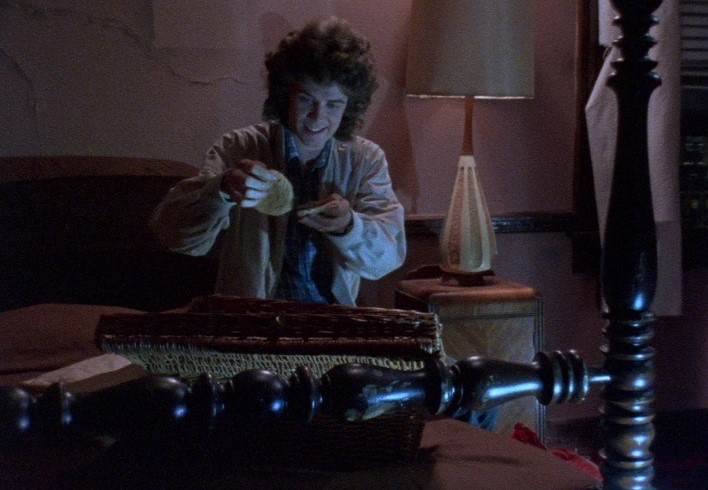
This picture follows many of the tropes of exploitation pictures, but does so in a refreshingly over-the-top and exaggerated way, turning it into a surreal parody. Many of the elements are intended to shock and raise eyebrows. That includes the deliriously creative deaths that befall a few characters (faces and organs are torn apart, and there is a memorable moment featuring an individual’s face being impaled with surgical scalpel blades). The movie is extremely graphic, but intentionally presents its characters in aggrandized ways so that viewers aren’t permanently disturbed by what they’re witnessing.
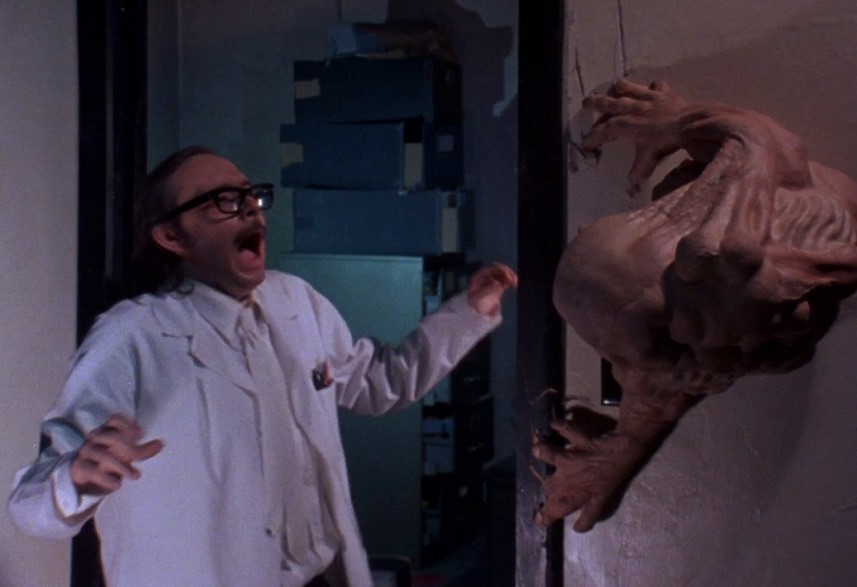
VanHentenryck manages to keep one engaged in his story to follow it through all of the amusingly strange beats. There doesn’t appear to be a specific viewpoint here as far as the treatment of Belial goes, or what we define as being human. Viewers see the two lead characters as both vicious and loving (at least, with each other). Henenlotter appears to be poking fun and taking shots at everything and everyone he can.
The movie is also notable for its photography. It presents a long, lost view of Manhattan and Times Square before these spots were revamped and turned into clean tourist destinations. Anyone watching the movie can see the real X-rated shops, as well as dirty streets and alleys that populated the area. From a historical perspective, it’s amazing to see just how much the city has changed and the film is an amazing document of an era. One fascinating bit (that is detailed in one of the extras) features the lead actor running naked through the public streets of Tribeca. At the time, no one went into the area at night and so this was all performed without a permit during a regular evening!.
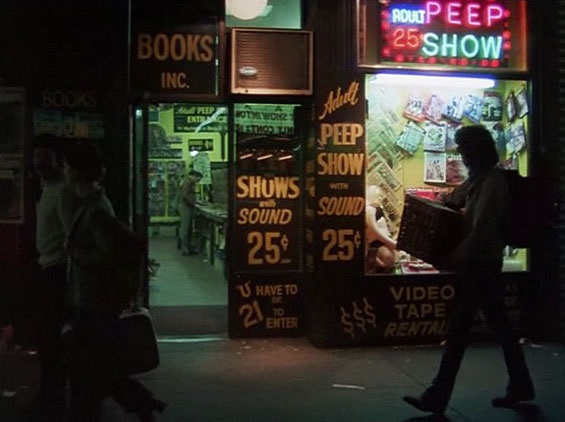
There are so many remarkable elements to this picture that it’s easy to understand how it became a phenomenon and turned into a low-budget cult classic. The film is equal parts icky, disturbing and funny, leaving a lasting impression.
Besides the picture upgrade, the disc comes with so many bonuses that it’s hard to go through them all here. There is an excellent, newly recorded commentary with Henenlotter and VanHentenryck in which they detail how many of the scenes were shot. You’ll get specific stories about the low-tech way in which the movie was made as well as information on the practical effect. When a victim’s torso is ripped open, the director notes that the innards were leftover crew pizza covered in fake blood. Henelotter talks about how tough it was making the movie, noting that it was shot over an extended period of time. If he didn’t have enough money to pay for lunch, he’d have to stop shooting for the day. The crew was also almost attacked by an unstable person while shooting in Times Square. These and other tales are incredible to listen to.
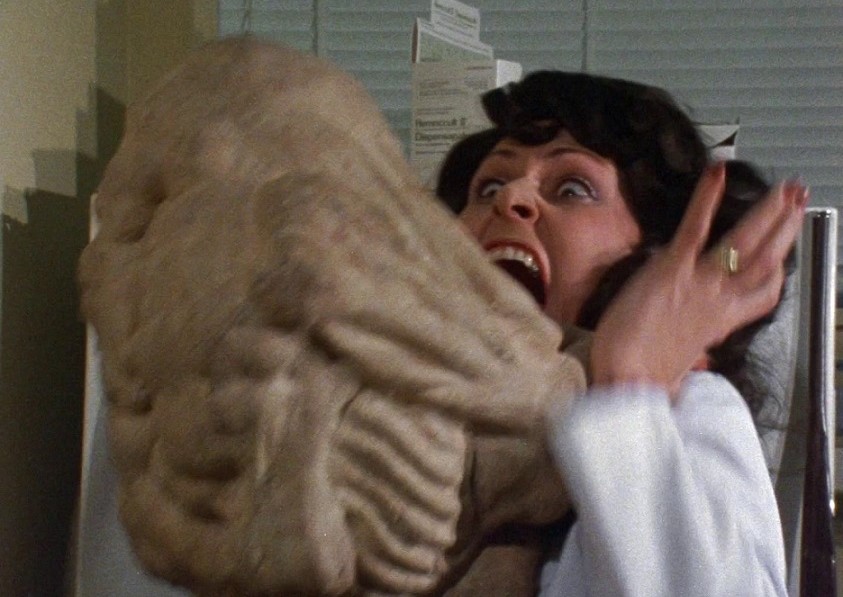
Additionally, there is an archived commentary with Henelotter, a producer and cast member Beverly Bonner that goes over their experiences on the film. Basket Case 3 1/2: An Interview with Duane Bradley is an amusing short film by Henelotter in which he interviews the character of Duane and finds out what he and his brother Belial are doing now. There’s also a new interview with VanHentenryck in which he discusses how he got involved with Henenlotter and his memories of the production. He notes that while he loves the movies, he does wish that he had also played the part of his twin brother Belial in the picture. Additionally, there is an eccentric interview with the director that aims to shock with its imagery.
And that’s not all. The disc contains interviews with Florence and Maryellen Schultz, who both appeared in the film as nurses. There is also a recent interview with co-star Beverly Bonner who plays a memorable character and has appeared in all of Henelotter’s films. There are also interviews with producer Edgar Ievins, actress Ilze Balodis, make-up artist Ugis Nigals and Kika Nigals who warmly describe their experiences working on the production.
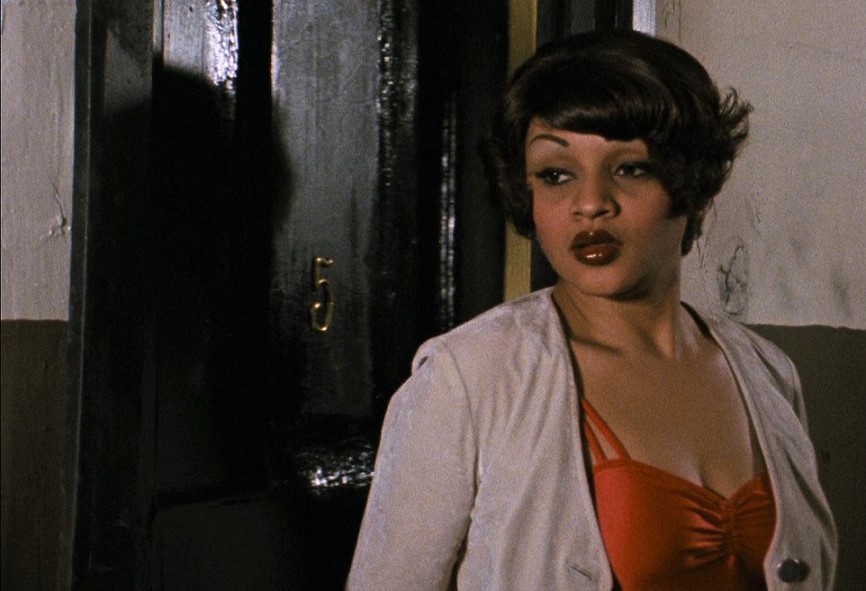
One of my favorite bits is an interview with Joe Bob Briggs, who was the first to champion the film and started drawing attention to it after watching it at Cannes in a nearly empty screening room (he recalls that everyone else there was disgusted by what they saw). Briggs was an instant fan and even set up a US premiere screening at a Texas drive-in. There is also a Q&A with Henelotter from the 2017 restoration premiered at the Museum of Modern Art.
Another highlight is the 78-minute documentary Who’s in the Basket? which goes over the history of the franchise and its two sequels. Henenlotter tells fantastic tales of trying to get other independent features made (the filmmaker was often told that he needed to make a sequel, but resisted for years). Eventually, he found a compatriot in executive producer James Glickenhaus. After meeting with the studio head and getting nowhere with his first couple of ideas, Henenlotter made up the plotlines for Frankenhooker and Basket Case 2 on the spot and immediately got financing. The director was very pleased with the first sequel, its ideas and somewhat lighter tone, but goes on to express his issues with the second sequel. He admits he was tired and there were major problems behind-the-scenes with other executives. Script pages and effects were suddenly cut from the production and he had to improvise many added elements to meet the same running time. The documentary is phenomenal and a must watch.
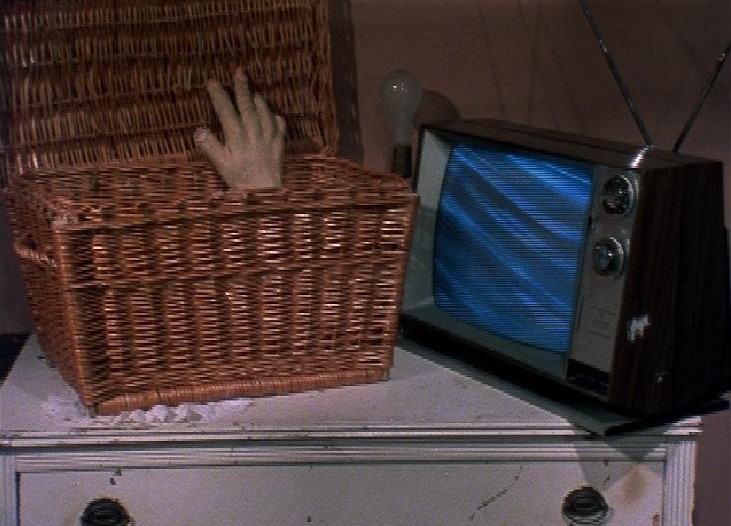
There’s also a good video essay on the movie that makes arguments about what the Basket Case series is saying and how it empowers outcasts. As if that wasn’t enough, Henenlotter’s notable short film Slash of the Knife is included, along with outtakes and an image gallery. There are also outtakes from Basket Case, a 2017 animated short inspired by the movie, a making-of for that bit and a ton of promotional materials for the film.
Additionally, it comes with a booklet with more essays on the movie, as well as a mini-poster. And you can get a special version from the Arrow Video website if you’re interested in more exclusives.
If you’re a fan of classic, low-budget horror, then you owe it to yourself to pick up Basket Case. The 4K Ultra HD edition is full of great material and offers a surprisingly strong picture with an impressive restoration.


